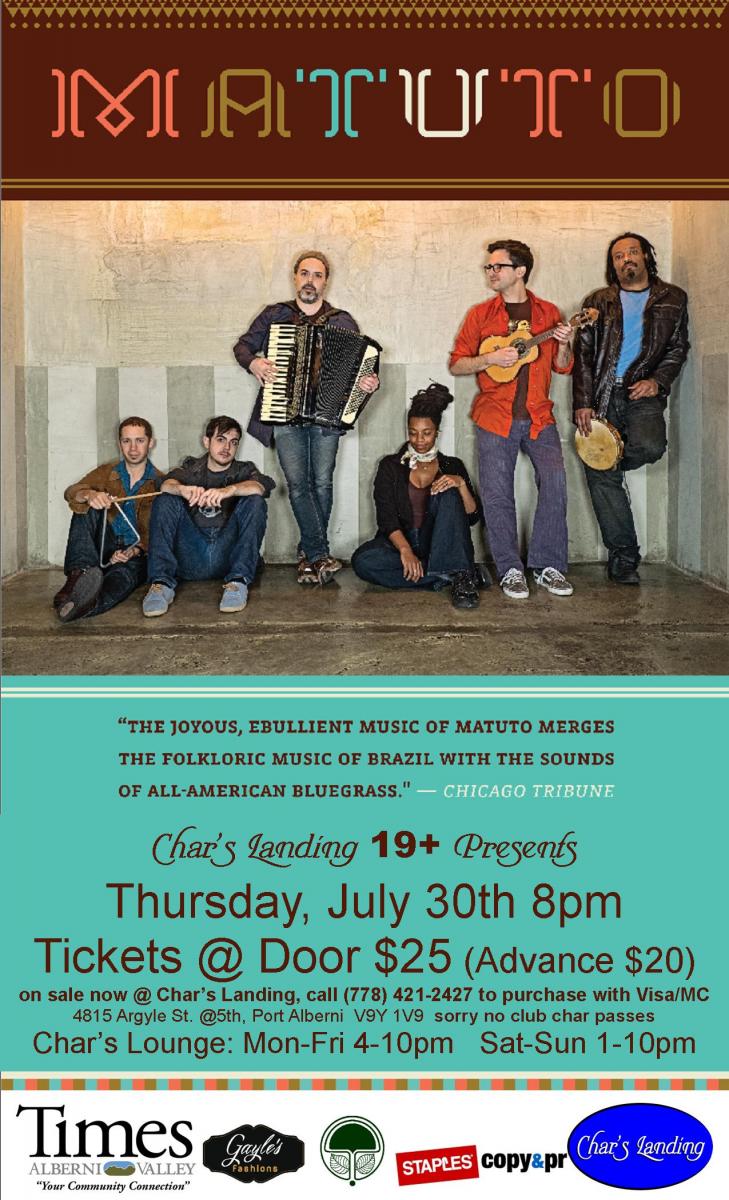
Date:
Venue:
Contact:
Thu, Jul 30th , 8-10pm, Concert – Matuto– Summer Tour 2015-2016 - Brazilian Bluegrass
Matuto is the kind of band that could only be born out of New York City’s vibrant culture. Its members hail from many different backgrounds, but operate as a loose groove-based collective drawn to folkloric music and the dance rhythms of the city. The band features guitar, accordion, bass, drums, violin, and various Brazilian percussion instruments: the alfaia (a large, wooden, rope-tuned bass drum), the pandeiro (a Brazilian tambourine), the berimbau (a single-string on a bow struck with a small stick), and the agogô (a pair of small, pitched metal bells).
Matuto’s songs can sway hips just as easily as spark insights. Drawing on Northeastern Brazil’s folkloric rhythms like forró, maracatu, or coco, and on deep Americana—from bluegrass to spirituals to swampy Louisiana jams—Matuto uses unexpected Pan-American sonic sympathies to craft appealing, roosty, yet philosophical tales of love, self-discovery, nostalgia, and true peace.
www.matutomusic.com
http://www.youtube.com/embed/JLpcbUqy8r0
https://www.facebook.com/events/585966424873463
Tickets @ Door $25 Advance $20 on sale now @ Char’s Landing or call (778) 421-2427 to purchase with Visa/MC *SORRY NO CLUB CHAR PASSES*
FMI http://alberni.ca/events/15639 Char’s 19+ Lounge opens M-F 4pm, S-S 1pm www.charslanding.com Char’s Landing, 4815 Argyle @5th. Port Alberni V9Y 1V9
Matuto Bio
It’s Carnival in Recife. It’s Mardi Gras in New Orleans. And watch out: That just may be the Devil spinning through the dancing crowd, trying to get friendly with the saint in disguise, with the diamond in the rough. The rolling drums and quicksilver accordion licks, the earthy vibe and thoughtful reflections mingle on Matuto’s latest refinement of their Appalachia-gone-Afro-Brazilian sound, The Devil and The Diamond (Motema Music; release: May 14, 2013).
Matuto’s songs can sway hips just as easily as spark insights. Drawing on Northeastern Brazil’s folkloric rhythms like forró, maracatu, or coco, and on deep Americana—from bluegrass to spirituals to swampy Louisiana jams—Matuto uses unexpected Pan-American sonic sympathies to craft appealing, roosty, yet philosophical tales of love, self-discovery, nostalgia, and true peace.
“The devil is what’s keeping us from our best selves, which is the diamond we have the potential to become,” Ross explains, spinning the narrative thread that ties the album’s pieces together. “That tension exists in all of us and in a loose way, this album outlines the journey we take, when we wrestle with the devil and find the diamond.”
What wide-ranging Americana and jazz guitarist Clay Ross and accordionist Rob Curto, one of the movers behind New York’s Forró For All (when not touring with folks like Lila Downs and David Krakauer) began as a curious exploration of their shared musical loves, Matuto (a Northeastern Brazilian slang term for “bumpkin”) has blossomed into a platform for expressing broad truths, ideas inspired by Buddhist sutras, personal epiphanies, and the musicians’ down-home upbringings.
Matuto are part of a broader, loosely defined movement of hard-to-define acoustic innovators, musicians savoring their own heritage as they commune across genre and cultural bounds. Hailing from different parts of the country, Ross and Curto first met in Brooklyn’s genre-defying music scene. After laying down tracks on each other’s albums, they headed to Recife together and became fast friends as they played music, listened to local ensembles, held workshops in favela community centers, and won over local fans.
Friendship and co-creation honed the original Matuto idea. They turned what could have been little more than a wacky side gig into a serious musical venture, in which seemingly disparate threads and brainstorms are woven together organically. “Our sound has really gelled,” explains Curto, “and our style has become more codified.”
Matuto can start with an unexpected arrangement of an old chestnut like “Wayfaring Stranger” (resulting in “Diamond”), or with harmonium lines from a jam session with an Indian vocalist (“Tears”). Inspiration may come from Brazilian Folk Music (“Toca o Sino”) or from Carolina childhood horseplay sessions (“Horse Eat Corn”).
But it all comes together, as far-flung sounds converge in coherent, seamless songs, in music leaping beyond the fun of fusion, to express a bigger artistic picture, be it a tale of thwarted desire or the challenge of tussling with inner demons.
This mix has proven to have real legs, taking the band from club dates in the Deep South to diplomacy-minded State Department tours across Eastern Europe and West Africa. A showcase in Copenhagen got the band a gig at one of the most staunchly traditional festivals in Recife, the Feast of St. John, Brazil’s biggest forró event. The traditionalists get it: Matuto has distilled the spirit of the music, even as they have blended it with other sounds, and kept its steamy, sensual dance side intact.
“Matuto does what we do out of love,” reflects Ross, “and our message is simple: Follow your passion, if it leads you to Brazil, or to Cajun, klezmer, or hip hop music, it doesn’t matter. Follow your bliss and don’t worry”
“We feel that way playing music together,” Curto adds. “We can just look at each other and start laughing. There’s a lot of humor and joy, even in the most serious moments.”

